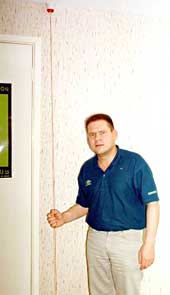|
War pension denied |
"I can call a nurse by pulling
this
rope." Paul Connolly (37) reaches
up
toward the rope dangling from the ceiling
and laughs weakly. He took part in
the Gulf
War as a civilian, and now lives in
two small
rooms in a municipal housing complex
for
the elderly or ill in families on welfare.
![]() To the Gulf for telecommunications duty
To the Gulf for telecommunications duty
"Since September last year, I have to go to the hospital three times a week for kidney dialysis. If I don't, I could fall over dead." The IV scars covering both arms look painful.
Connolly lives in municipal housing provided by his hometown, Saint Jones, a city located about one hour southwest by car from central London. He graduated from junior high school at 16 and joined a telecommunications company, where he became a skillful systems engineer for military installations.
On the battlefield, the reliability of telecommunication systems can mean life or death, and the army would be using this equipment for the first time during actual operations in the hot desert. The army needed an experienced engineer, so under its military contract, Connolly's company asked him to go to the Middle East. "I'd be lying if I said I wasn't scared, but I said OK."
He had been using the battlefield telecommunication
system since the late 1980s on British bases
in Germany, so he knew it well. However,
the conditions in the Middle East were much
tougher on outdoor telecommunications equipment
than anyone had imagined. "We were constantly
running fans to cool the condensers. And
unless we continually blasted the desert
dust out with compressed air, the fans would
break down."
![]() Loss of strength leads to loss of job
Loss of strength leads to loss of job
At the end of work every day, Connolly's face and body were covered with dust. He encountered several sandstorms. As the battle expanded, he travelled back and forth from Saudi Arabia to Kuwait to Iraq. "I saw plenty of gruesome-looking Iraqi bodies."
He went home about three months after the end of the fighting, in May 1991. From about that time, Connolly's physical condition began to deteriorate. By July he was forced to quit work. "I was just too tired. I had no energy at all." Later, he was employed at another company, but he started getting terrible headaches. His condition worsened steadily.
The results of a kidney test in 1993 were bad: nephritis. It was 1994 before Connolly heard the word "depleted uranium" (DU) or that large numbers of Gulf War veterans were experiencing problems with their kidneys. "I saw a newspaper article that said that DU particles in your body can cause radiation damage. It also said that DU is a highly toxic heavy metal that can damage kidney function."
Connolly is convinced that he inhaled every harmful substance in the battlefield environment. Though he had been working as a civilian, he demanded that the Ministry of Defence give him a free blood test and X-ray exam. "The doctor admitted I was sick, but said, 'This has absolutely nothing to do with the Gulf War.' He was very cold about it."
Meanwhile, Connally's body was failing. In 1996, he quit his job. Unable to pay his house note, he lost his house. He also lost his girlfriend, who had been living with him for five years. He would have been homeless without his older sister and her family. Three months later, a letter from his doctor to the city made it possible for him to move into municipal housing.
That same year, he had his urine analyzed
by Canadian and American specialists a Gulf
War veteran had told him about. "There
were signs of DU, but there was so much protein
in the urine it was impossible to isolate
it. The same results came back from both
scientists."
![]() Living with despair
Living with despair
He applied to the military for the war pension given to veterans who are injured or become ill in the line of duty. The reply was, "Not qualified." At this point, he lives on his weekly welfare check of 70 pounds a week.
"What I'd like to do is get a kidney transplant and take my situation to court to bring the facts to light. But I made up my mind not to hope anymore. I've had plenty of disappointments." Connolly spoke with a bitter laugh. "All I can do is laugh. If I don't laugh, I'll cry."
Connolly lives day to day in the depths of despair, and I could find no words of comfort to offer.

"There's one of these in every room," says Paul Connolly, indicating the rope from the ceiling that he can pull in an emergency. (Saint Jones, England)